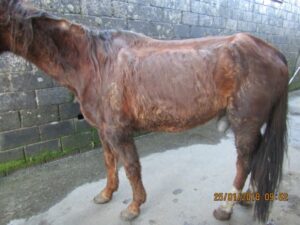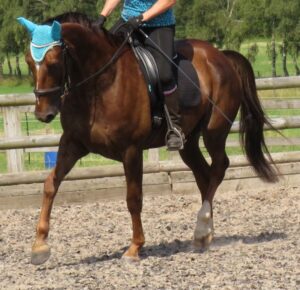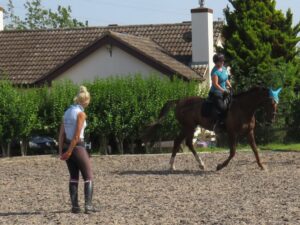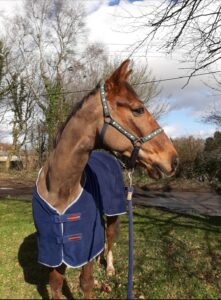Zorro at the time of rescue – image courtesy of RSPCA
While the market for proven ridden and competition horses is booming, thousands of horses find themselves in an invisible lower layer of neglect, only becoming visible when they are abandoned or are found in squalid living conditions.
Having always had horses of my own, when the time came to find a new riding horse I contacted the RSPCA. By offering a home to a rescue horse I would be helping two horses – the one that I re-homed, and the next horse that would be able to fill the vacated space in the rescue centre. I was offered the opportunity to view a 16.1hh, 8 year old, French Standardbred gelding called Zorro. He was an ex-harness racer and had been ridden for about a month during his time with the RSPCA. Although he had only just started his ridden career, he was a well-mannered ride and seemed keen to please. As soon as I sat on him, I knew I’d found my horse!
Research into Zorro’s background revealed that he had won a 10,000 Euro trotting race in Paris as a 3 year old and continued as a regular winner in Ireland until 2016. He was sold out of the harness racing industry and found himself in a bad home, where, along with another retired trotter, he was neglected and became severely emaciated. His fur was infested with lice, he was full of intestinal worms, and he had an untreated sheath injury. Fortunately, the RSPCA found both the horses in time and, following a prosecution, they were successfully rehabilitated.
Zorro back on form, ridden by Hilary
Zorro is a wonderful gentleman; he’s highly intelligent and learns quickly, and is a pleasure to have as part of my family.
I chose the RSPCA over other charities because I wanted to own the horse myself, rather than have one on loan. In contrast to other charities, following a successful six-month probation period, the horse is signed over into your ownership and it is hoped that the horse will remain with you permanently. If the horse isn’t suitable, you are able to return it during the first six months – a big advantage over buying a horse where there is usually little or no trial period. The donation fee is much less than a normal purchase price and is a small contribution towards the huge cost of vet bills, specialist care, and, in some instances, legal action against cruelty or neglect.
Zorro and Hilary having a lesson with Sam Brown
For those who prefer the safety net of being able to return a horse to a charity if their situation changes, many equine charities retain ownership and you can return the horse at any time.
It’s difficult to believe that a kind, loving, gentle and talented horse like Zorro could end up as a rescue case. He’s admired and loved by everyone and is a great ambassador for rescue horses and for the ridden potential of ex-harness racers; a type that tends to be overlooked as a riding horse. I hope that Zorro may inspire riders to consider giving a home to a rescue horse, and perhaps to choose a type that is often ignored but that has a great deal to offer.
If you enjoy the company of horses but don’t want to ride, charities are bursting at the seams with horses that cannot be ridden, perhaps due to a previous injury. Non-ridden horses may often be suitable for activities such as horse agility, a growing sport that you can do for fun or competitively.
I was incredibly lucky to find my dream horse in a rescue centre. Yours may be waiting for you.
Zorro, everyone’s dream horse. It could all have been so different. Thank heavens he was saved.
For more information: WWW.RSPCA.ORG.UK




